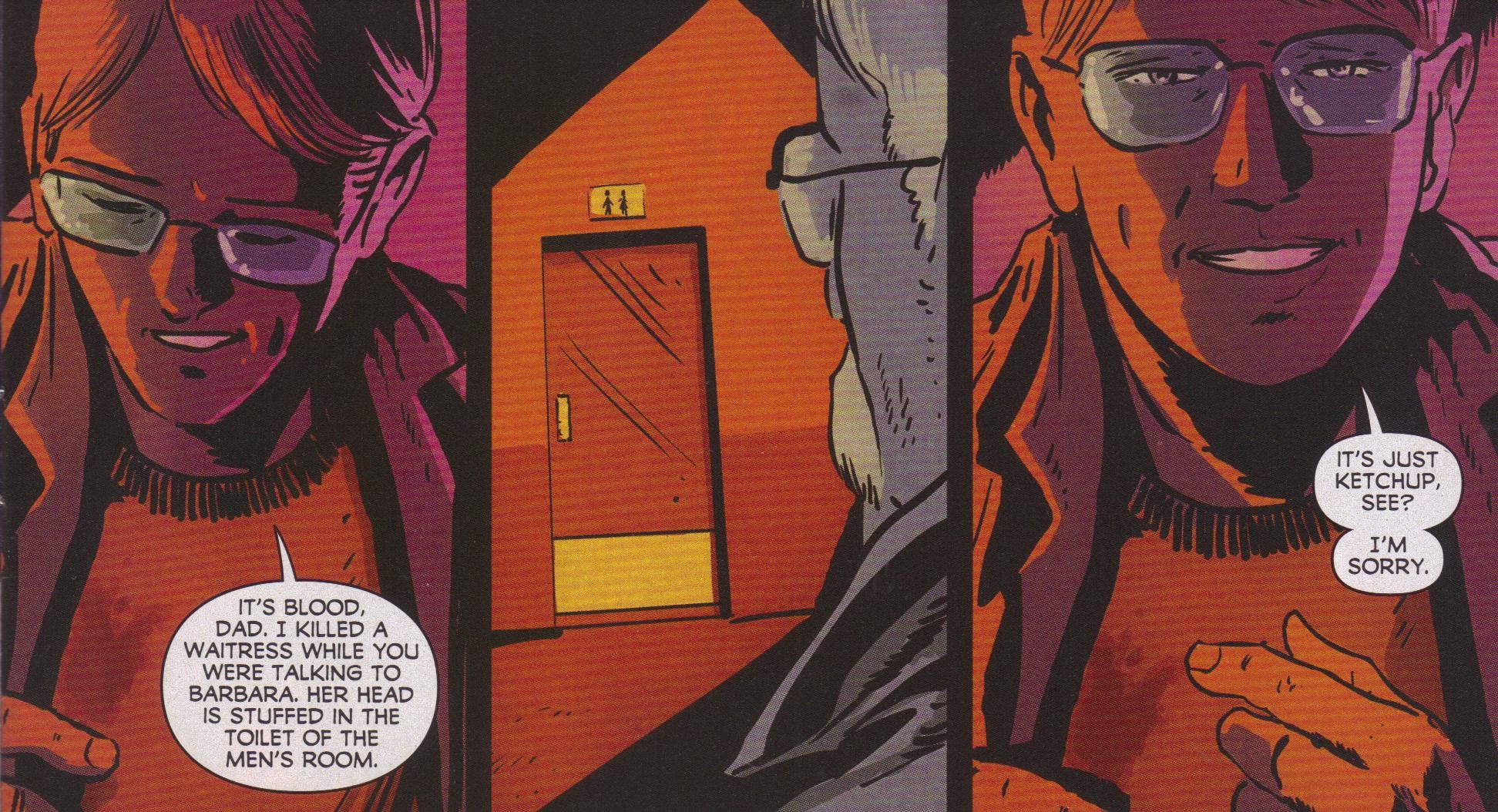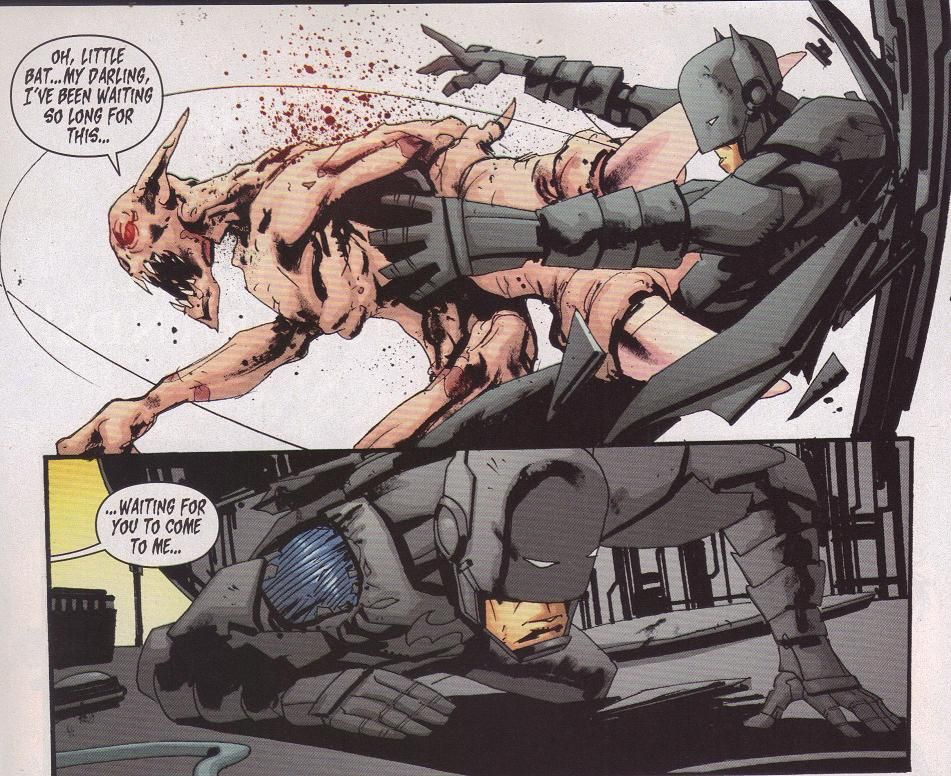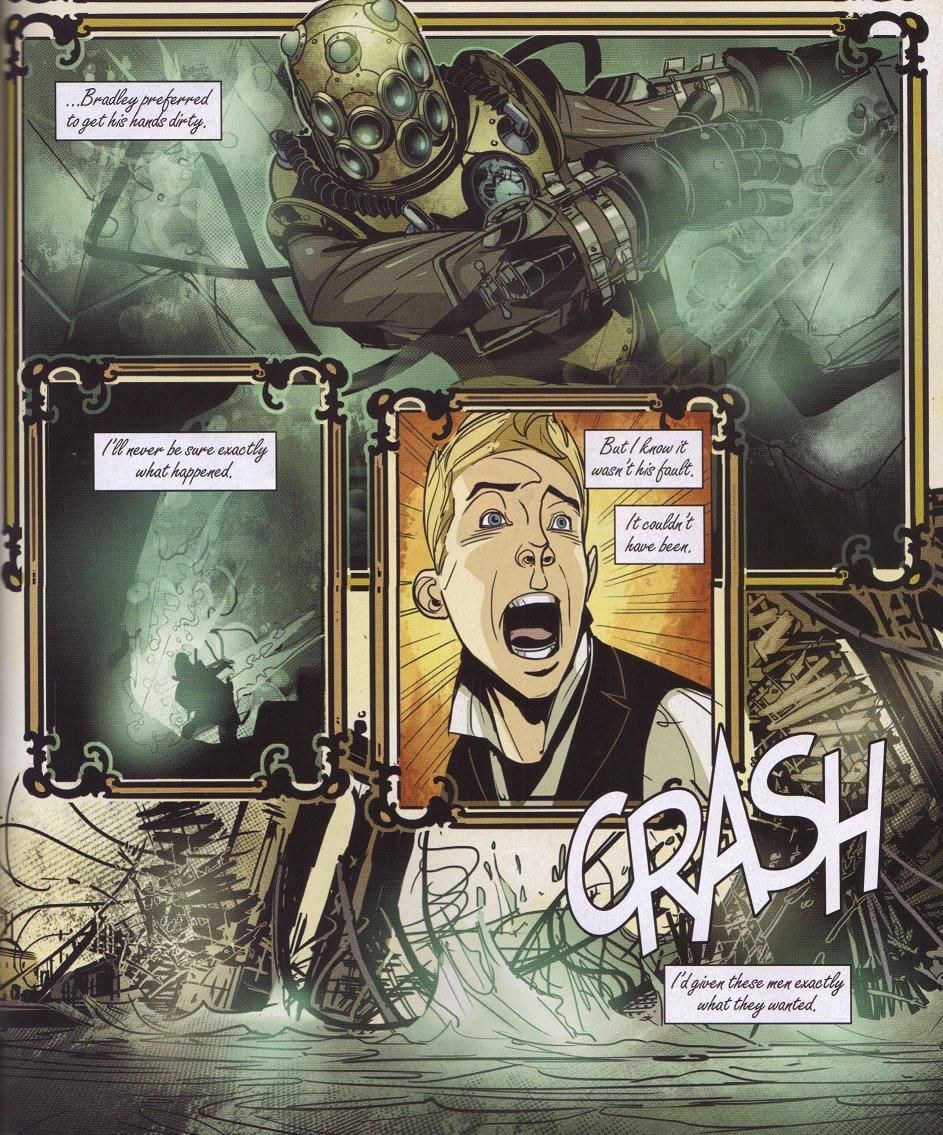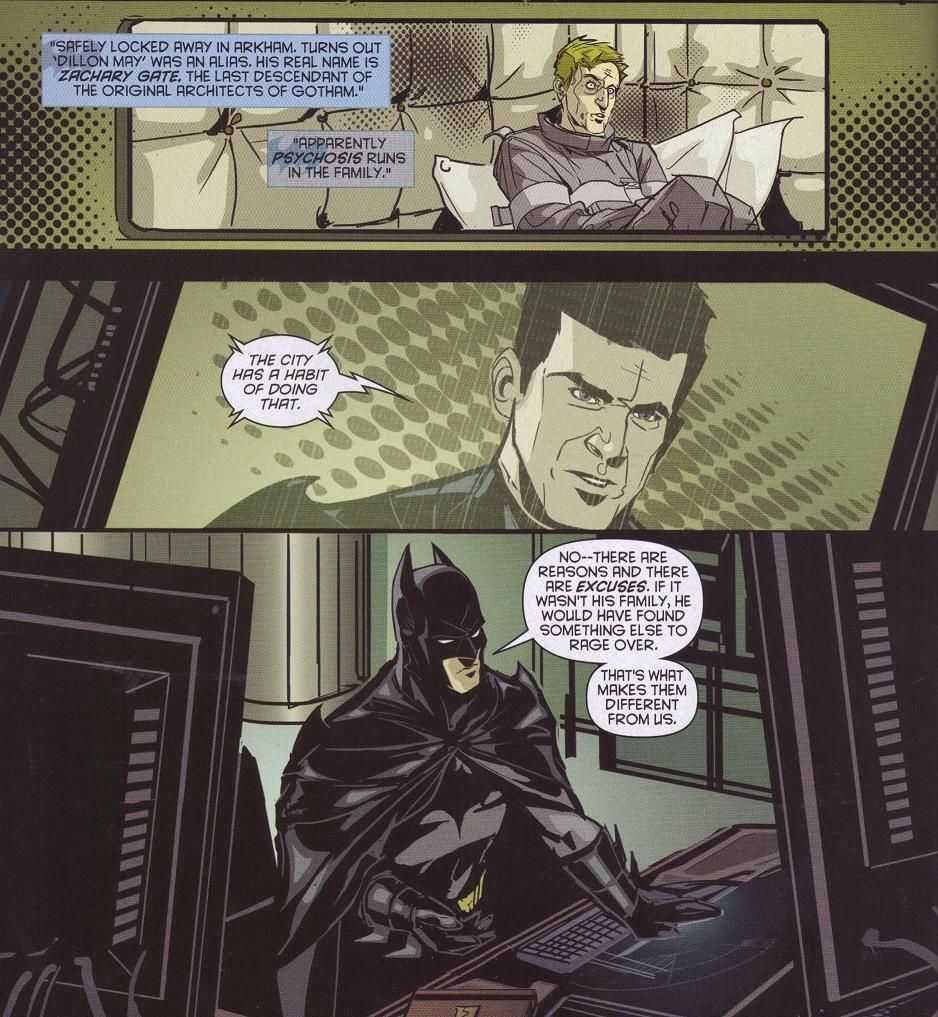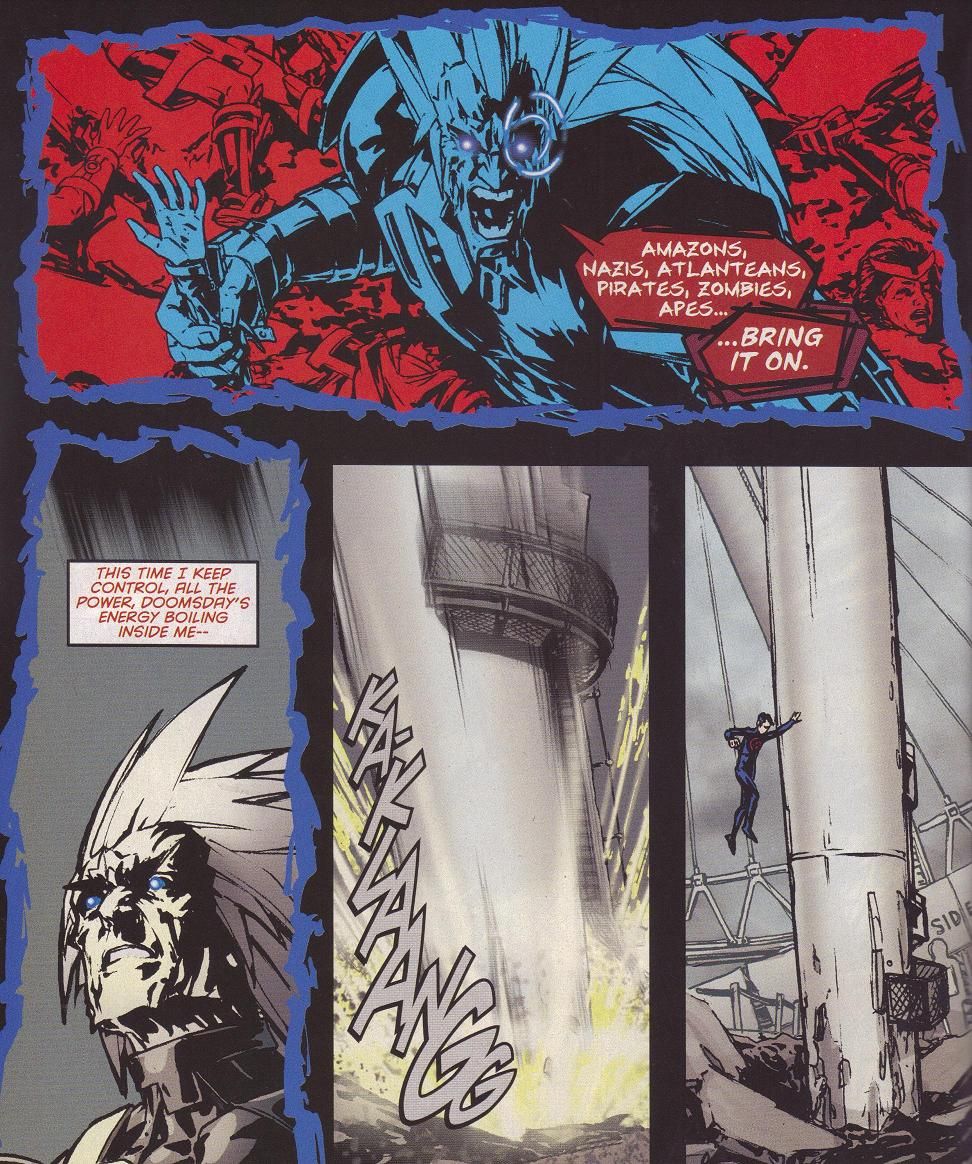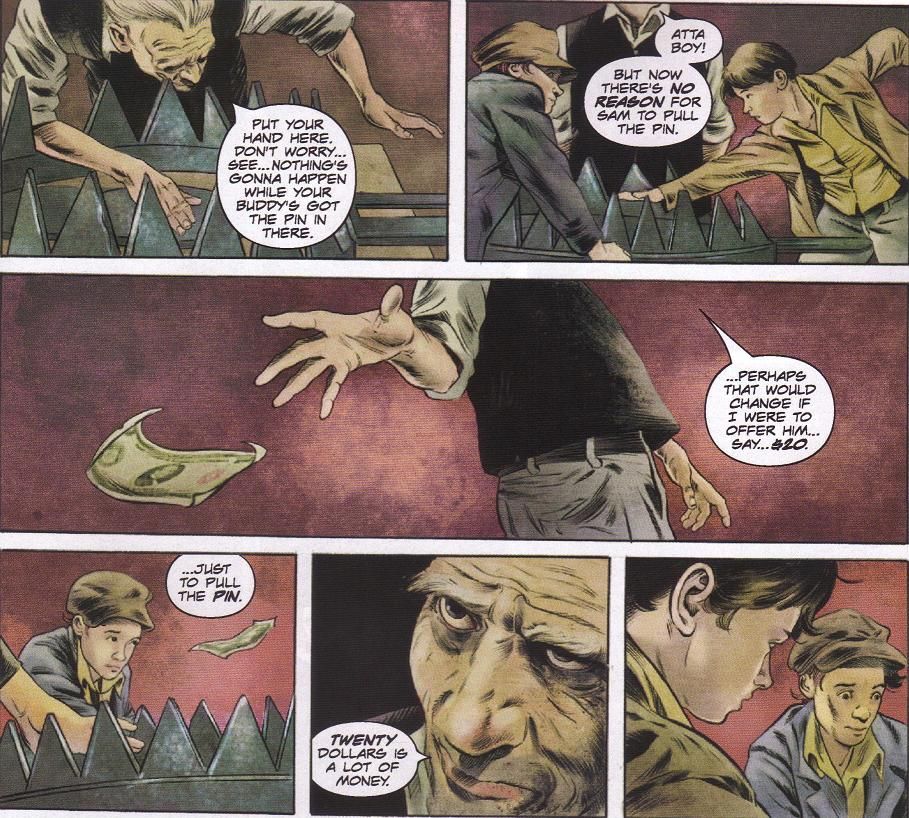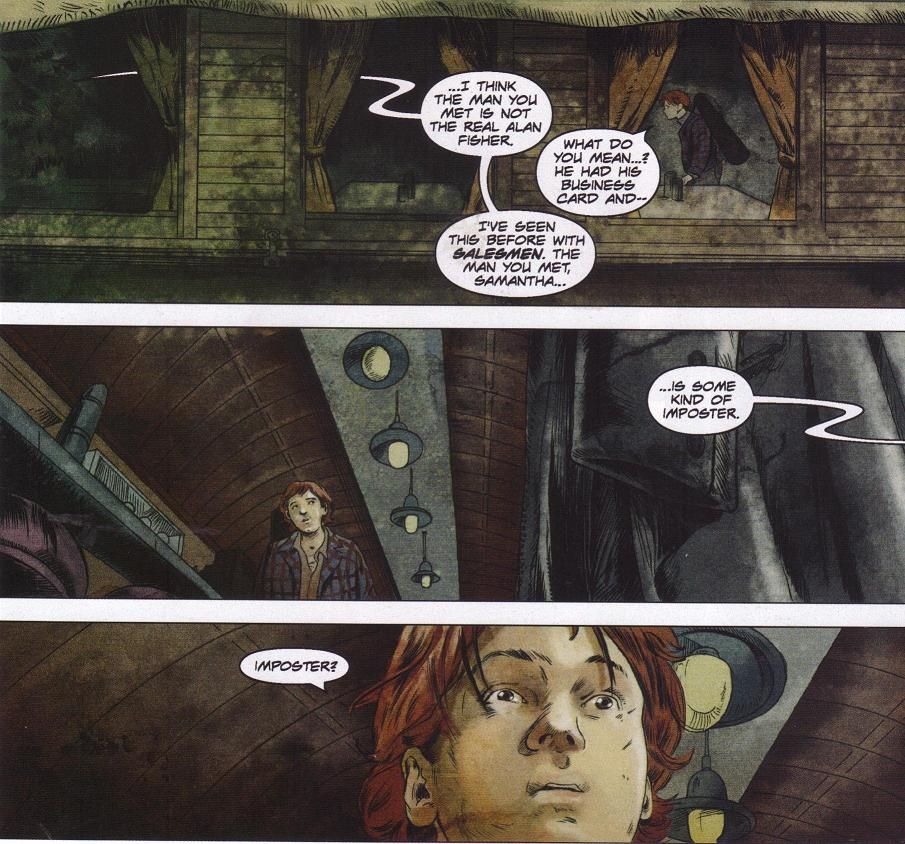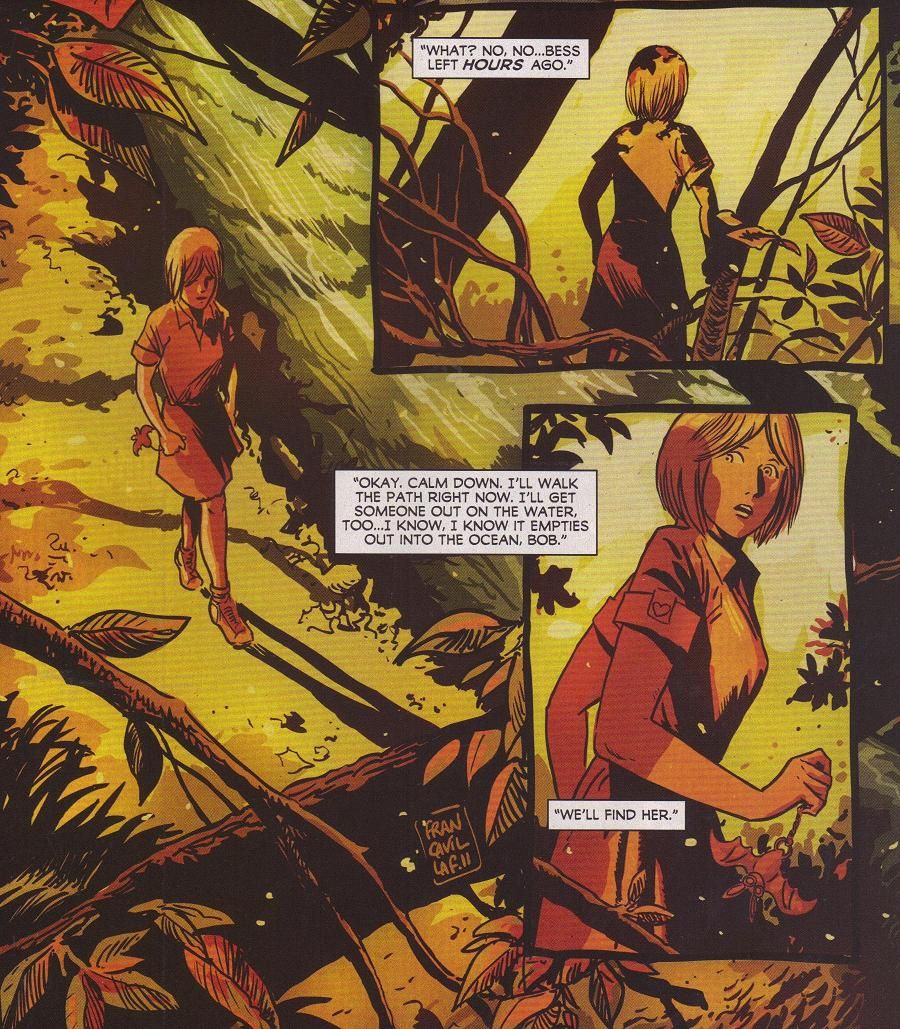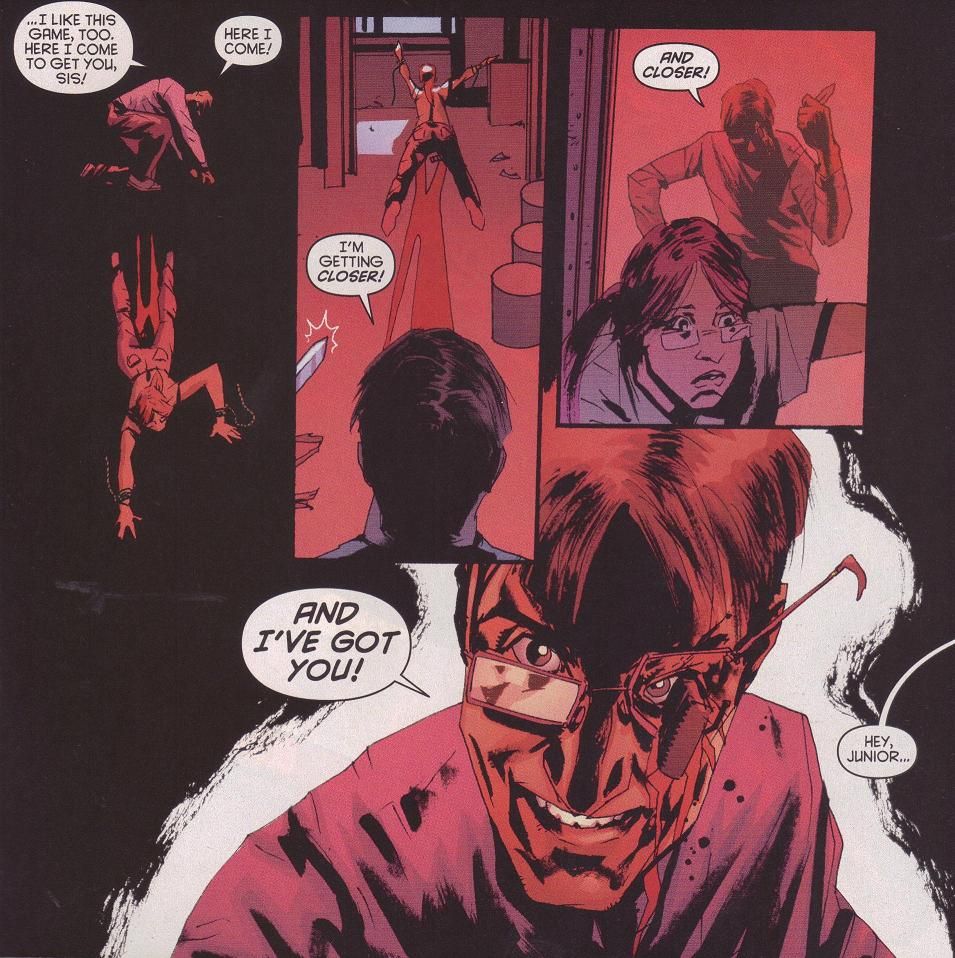As a writer, that is. I don't know him personally, so maybe he's an excellent dude, one you can trust with your life or your money or to babysit your kids. But as a writer ... I just don't trust him yet.
SPOILERS, in case you're wondering. Deal with it.
Now, you'll notice I don't say I don't like Scott Snyder's writing. If I didn't like Snyder's writing, I probably wouldn't care that I don't trust him. I have read a LOT of his work. I didn't read his early Marvel work. I haven't kept up with Swamp Thing past the first trade, and DC hasn't released anything but the first Batman trade in softcover.
I haven't read Volume Four of American Vampire yet, but it will be out later this summer, so I'll get to it then. I skipped The Wake because I'll get it in trade, and I was not going to pay 5 bucks for Superman Unchained. But I like Snyder's writing, and I'll continue to like it ... unless my mistrust of him gets the better of me.
Snyder is the hot writer du jour right about now, as he's writing both Batman and a new Superman comic (which is drawn, for a time, by Jim Lee - what's the over/under on number of issues that Lee lasts?), plus he's doing a new Vertigo book with phenomenal art. American Vampire is on hiatus right now (isn't it?), but that's also another hot property. In other words, Snyder is the "it" guy, at least at DC. You know me, though - I enjoy being a contrarian, so I have to point out Snyder's Achilles' heel, at least so far, and the reason why I don't trust him - the dude is lousy at endings. You might disagree or not even care, but when you're writing something, ending it well is as important as beginning it well, and Snyder, while excellent at beginnings, hasn't stuck a landing yet in his short comics-writing career. It's this crucial detail that keeps me from embracing him completely, and it's too bad.
Now, this flaw (as I see it) isn't too evident, because Snyder's big projects - American Vampire and Batman - haven't actually ended yet. That's one thing that keeps the Vertigo book, at least, quite good - Snyder is able to "end" story arcs but still lead into the next one fairly well, and while I've only read the first trade of Batman, it didn't really "end" as much as act as a prologue to the future issues.
I noticed, however, that around yonder Internets, several people expressed their disappointment with "Death of the Family," specifically how it ended. I wasn't surprised, because I've noticed this trend about Snyder for a while. I'd like to break down his comics that have actually ended to show how he's just not very good. With that in mind, I'm going to briefly look at Gates of Gotham and Project Superman before moving on to Severed and Detective Comics. Of these four, Snyder is the sole writer only on 'Tec, and in fact on the first two he just gets a story credit, so I'm not sure how much of the "blame" is his, which is why I'll be brief with them. Severed, while written with another person, seems to be a bit more of a "Snyder" comic (even though, as I'll note, it might not be), so I'll get into that a bit more, and then I'll look at his pre-DCnU run on Detective, in many ways a superb run, which is why the ending is so disappointing.
Gates of Gotham is scripted by Kyle Higgins from a story by Higgins and Snyder, so I'm unsure how much of it comes from Snyder and how much comes from Higgins. Similarly, Project Superman is co-plotted by Snyder and Lowell Francis, with a script by Francis, so again, it's hard to tell how much is Snyder. Gates of Gotham is a decent enough mini-series, while Project Superman works only if you read it as a complete parody of over-steroided superhero comics, because if you read it straight, it's terrible. Both series continue Snyder's obsession with father-son relationships and his somewhat strange ideas about mental illness, so those parts is probably his, but again, the weak endings of these books probably can't be solely attributed to Snyder. Gates of Gotham is a fairly standard Batman story, and so the ending, while not great, is no different than many other Batman stories. Bats (Dick Grayson in this iteration) figures out who the bad guy is completely inexplicably - the dude goes from "someone who used to own the 'Architect's' suit but reported it stolen six months ago" to "crazed guy destroying everything in Gotham City" without comment from any character - but that's a fault of many Batman stories. The explanation for what happens to both Nicholas Gate and Dillon May is annoyingly contradictory - on the one hand, wearing the suit makes you crazy, but on the other hand, Dillon May is crazy because "psychosis runs in the family" (that's Bruce's line, so maybe we can forgive him for not being up on the facts of the case).
"Psychosis" is a ridiculously broad term and shows Snyder's disregard for trying to deal realistically with mental illness (and, again, to be fair to Snyder, most writers do this), but even if we believe that May's "psychosis" was somehow inherited, Gate had a child before he became crazy from wearing the suit too long, so how ...? You know, it's just dumb, so we'll leave it at that. As for Project Superman, it's an unpleasant, unholy mess of a comic, one that actually begins fairly well - with Lois Lane's dad trying to create a superhuman but then abandoning it when Kal-El lands in their midst and they don't have to and that pisses off their test subject, who decides to take matters into his own hands - but about halfway through begins to become more and more ridiculous so that by the end, it's awful. I'll get back to this theme - that Snyder has really good ideas that fall apart quickly - in a bit, but in Project Superman, the only thing that mitigates is that we might believe that Snyder and Francis are actually poking fun at the idiotic tropes of superherodom. I mean, Lois Lane gets killed in the most random fashion and, with her dying breath, talks about what a cliché it is that the girl dies while the hero lives. So while Project Superman is kind of a hot mess, if you read it as a parody it works slightly better. The reason I don't is because Snyder has never really shown that he writes with much of a sense of humor (that's not to say he doesn't put some funny stuff in his books, but he still seems to take them deadly seriously), plus this is Dan DiDio's DC, after all, where humor is verboten. But, again, neither of these books are Snyder's alone, so maybe we can give him a pass.
Severed is an interesting case, as this interview with co-writer Scott Tuft lets us know that he did the "actual writing" after he had plotted it out with Snyder. But Snyder saw the drafts and give notes, and Severed feels a lot like a "Snyder" kind of comic - the father-son dynamic is very important to the book, for instance.
Also, Tuft says Severed was his first comics work, so perhaps Snyder had more influence over him than he would over Higgins. So, like Gates of Gotham and Project Superman, it's possible we can't lay the blame - or at least the entire blame - at Snyder's feet. Severed, however, goes far more off the rails than those books. Gates of Gotham has a bland ending, but aside from a few weird quirks, it's just a standard Batman book. Project Superman has to end with certain things happening because it's part of a big crossover, so while Snyder and Francis had some freedom with it, they had to get to a point. Severed, however, is completely free of such constraints - it's an Image book, self-contained in seven issues. And after a very intriguing set-up, it turns into an absolutely horrible comic book, a lot due to the fact that the ending is terrible.
The story begins with an old man in the 1950s getting an envelope from his grandson, who got it from a stranger who claims to be an old friend of the elderly gentleman. When the old man sees what's inside, he's thrown into a flashback to 1916, when he was 12. His name is Jack Garron, and he lives on a farm in New York with his mother. At some point he found out that he was adopted, and he also found out his father's real name and they began writing letters to each other. So Jack runs away from home and jumps a train headed for Chicago, where he believes his father is a famous musician. Meanwhile, we're introduced to the villain of the piece, a mysterious dude who eats kids. Yep, he really does. He manages to get kids (and adults) to trust him, and then he takes the kids to a lonely place and slaughters them and eats them. Jack meets a girl named Sam as he's riding the rails toward Chicago (she pretends to be a boy, because it's safer - not much, but safer), and they become friends. In issue #3, they meet the bad guy, going by the name "Alan Fisher," who claims to sell phonographs and says he can help them find Jack's father. Sam, who's been on the road longer than Jack, doesn't trust him, and this leads to a bit of a falling-out between the two. "Fisher" manages to lure Sam to a remote location and kills her, and then he hits the road with Jack, who thinks Sam abandoned them. He, of course, finds proof that Sam didn't just leave, and confronts "Fisher," from whom he manages to escape, temporarily.
Of course, there's a final showdown, Jack loses an arm, and "Fisher" apparently dies in a fiery conflagration. However, the book ends back in the 1950s, when the older Jack realizes that "Fisher" isn't really dead and is still out there, hunting people. Dum-dum-dummmmm!
On the surface, it's a perfectly acceptable horror story. As we dig a bit deeper, it becomes dumber and dumber. In the very tense issue #3, the cracks begin to appear. Alan Fisher has the kids over for dinner and plays a game of chicken with a bear trap - he dares Jack to put his hand in the trap and says he'll give Sam $20, then $80, to pull the pin and chop Jack's hand off. She doesn't do it, but that's an example of "Fisher's" sense of humor. Sam thinks he's insane, but Jack, stupidly, doesn't think it's too bad. Now, because Snyder is obsessed with father-son relationships, Jack is obsessed with finding this father who abandoned him, so the fact that "Fisher" says he'll give him a ride to Mississippi (where Jack's dad has apparently gone) plays into it, but Jack is still marvelously stupid. Sam doesn't get off so easily, either - she already doesn't trust the guy, but when she calls his "boss" to complain about him, she just accepts that she needs to go to a diner in the middle of nowhere to talk to him? Come on, Sam! The book becomes more and more ridiculous in the final issue, where "Fisher" ties Jack up in a basement and cuts his arm off with a cleaver. He does this rather easily, it seems, and although he heats the weapon before he does so, the wound doesn't seem to be cauterized. Yet Jack doesn't go into shock but has the wherewithal to escape his bonds and attack "Fisher." He does this for quite some time, too - far longer than you would expect from someone who has lost a ton of blood. And, ultimately, like a lot of horror stories, there's no point to the story. There's an evil dude doing evil things, and you can't stop him. At least "Fisher" seems to be supernatural, so his survival can be "explained" in that manner, but it's still a ridiculously depressing comic, with female characters who are just props to be killed, a really dumb inciting event that might be intriguing if Snyder/Tuft examined Jack's obsession with his completely absent father, and no real resolution except for the fact that Jack survives.
It's brutal and awful. Again, I don't know how much we can blame Snyder for it, but given the fact that he delves into some of these other tropes in other comics, perhaps we can.
The final series I want to look at is all Snyder - his run on Detective Comics right before the reboot, issues #871-881. By many standards, this is a superb run of comics, and according to Snyder himself, it ended where he wanted it to end (DC's reboot might have truncated it unnecessarily, but our very own Kelly and Sue interviewed Snyder and he said it ended where he wanted it to, and while he might have been fudging a bit because of his position in the DCnU - no one wants to bite the hand that feeds it - that's his statement, so we have to abide by it), and he wrote it all by himself, so that's that. It's a really good run that kind of falls apart at - you guessed it - the ending. Let's examine it more closely, shall we?
First of all, Snyder does give us smaller arcs as he goes along, only slowly revealing the major bad guy of the arc, which is James Gordon Junior. His first arc is about an auction of various props that Batman's villains have used over the years and the evil dude selling them. He spends a few issues writing about James Gordon Jr., then gives us an arc about Sonia Zucco and her bank and how the new breed of criminal in Gotham is trying to force her to launder their money. Then, in the final three issues, he goes back to Gordon and links his story to a Joker story (of course). It's structured pretty well, with Jock and Francesco Francavilla sharing art duties - Francavilla tends to do the James Gordon Jr. stuff while Jock does the other stuff until the final issue, where they split the duties. It's very intense, and issue #875 is one of the best issues of 2011. So went wrong?
Well, Snyder doesn't stick the landing, of course (see the thesis of the post). He actually doesn't end the individual arcs all that wonderfully, but because they're shorter and fit into the bigger narrative, we can forgive those weaker endings.
When you re-read the entire 11 issues, you notice how absolutely bleak Snyder's writing is - Batman doesn't capture many bad guys, as the Dealer, Tiger Shark, and the ... other one (I don't want to spoil it too much!) all get away with it, more or less. Batman does capture the Joker, but his part isn't really that important, and Snyder does a pretty cool job showing that he's not interested in fighting Dick, as he considers him a low-rent Batman. But the bleakness of the writing doesn't mean that it's bad, and up until the final few issues, this is a brilliant run. But then James becomes the main villain. All along, he's been telling his dad and Barbara that he's fine - he realized he's a psychopath and he decided to get treatment, so he's taking medication for it. Snyder does a nice job never really showing us that James has done anything evil - it's all circumstantial, as bad things just tend to happen around him. It's only at the end of issue #878 that we see him doing something truly evil, and then the final arc kicks into gear in issue #879. Snyder does a few things terribly wrong, though. James is "just crazy," which is just downright boring. He gives a medical explanation for his "craziness," but it's still boring - Gotham already has a "just crazy" villain, and the Joker has become extremely boring over the past decade or two because he's "just crazy." James plans to put medication - the same meds he takes, the formula of which he has "inverted" - into the baby formula that comes into Gotham, in order to turn all the kids in Gotham into psychopaths because the medication blunts the development of their amygdalas (amygdalae?). Whether that science would work or not, it's a perfectly fine "supervillain" ploy. But Snyder fails to give James any reason for doing this beyond the fact that he's crazy. He tells Dick that it's because he wants to crush Dick's spirit because Dick has so much empathy, but that's a lousy reason, especially because it's kind of a hand-wavey one and Dick has already seen so much horror and not been crushed. Ultimately, James does this because he's "just crazy." It's an extremely disappointing way to end the run.
Similarly, like Jack from Severed, James (and Barbara) are apparently indestructible. James jams two knives into Barbara's femoral arteries and tells her if they get taken out, she'll bleed out in minutes. So of course he pulls one out, but Barbara doesn't bleed out or go into shock - she has the wherewithal to get away while James is talking like a Bond villain to Dick (another serious weakness of the ending) and wait for him to come and find her. Then she stabs him in the eye, which doesn't even slow him down.
Both Barbara and James should probably be dead, but they both survive. It's kind of annoying. Obviously, this is a comic book, but Batman has always supposed to be a bit more "realistic" than others, and the fact that James even says that Barbara will bleed out if he removes the knives highlights the fact even more. Again, in fiction, people tend to survive things that would kill or at least incapacitate us regular folk, but that doesn't mean it's not annoying.
All of these cases, if taken in isolation, could be excused. Snyder's run on Detective could just end weakly because Snyder was aware of the reboot crunch (even if that didn't affect him, as he claims) or because he just couldn't figure out a motivation for James to do what he does. Severed could just be a horrible misfire. Project Superman could be a savage satire rather than a weird, "serious" take on superheroes. Gates of Gotham could just be a fairly bland corporate project that the writers didn't think too hard about. The poor endings of the books, though, form a pattern, and the common element is Snyder. If we add that to the first trade of Swamp Thing, which had its problems, and the first trade of Batman, which had its problems, it's clear that Snyder, while a good writer, has a way to go before he's a great one. Every writer has their pet tropes, and Snyder's appear to be an obsession with father and sons, a mild interest in mental illness as a "motive" for doing horrible things, and the history of Gotham City. None of these are bad things to write about - his lack of sensitivity about mental illness notwithstanding - and if he wants to explore those things, bully for him. When you're writing comics with actual endings, though, you have to be able to end things well. Some writers are terrible at ending things, and Snyder should get some credit for not taking the easy way out of his stories and have a deus ex machina come in and solve everything. But his endings are still not very good, and it's quite worrisome to me. I like Snyder's first issues, because as an "idea" guy, he's quite good. But as he gets more and more high profile, I wonder if I'll ever consider him a great writer, because if he can't stick the landing, he's never going to get there.
But you know what? That's just my opinion. To each his own, I say!

